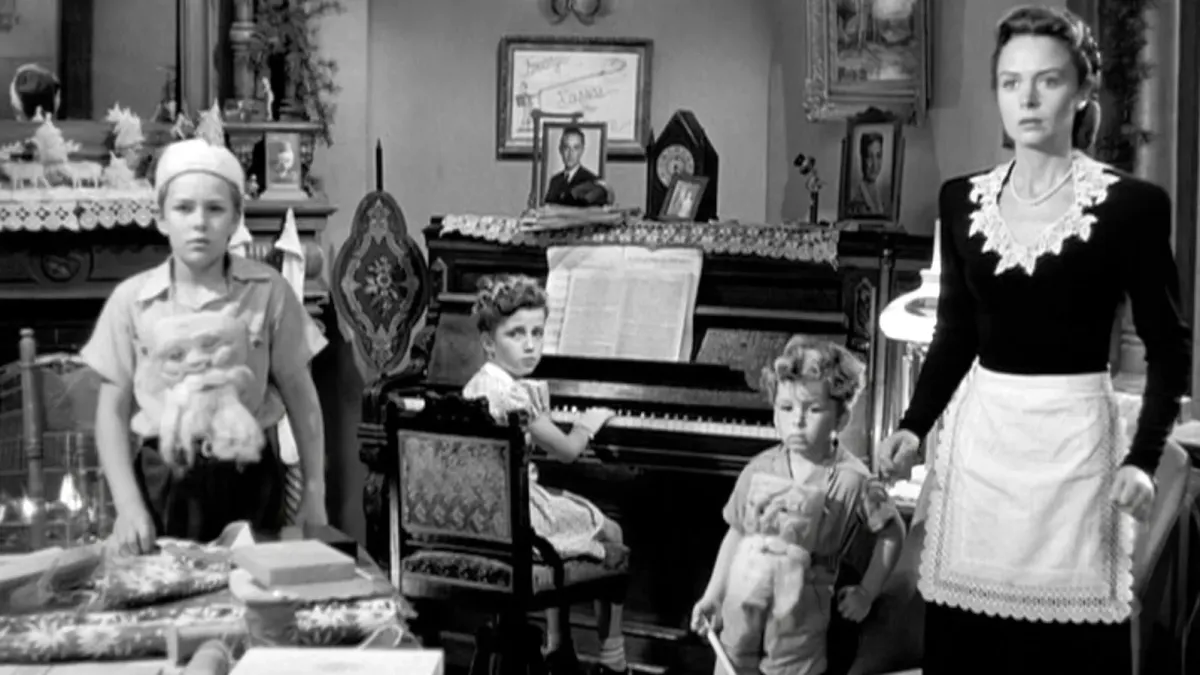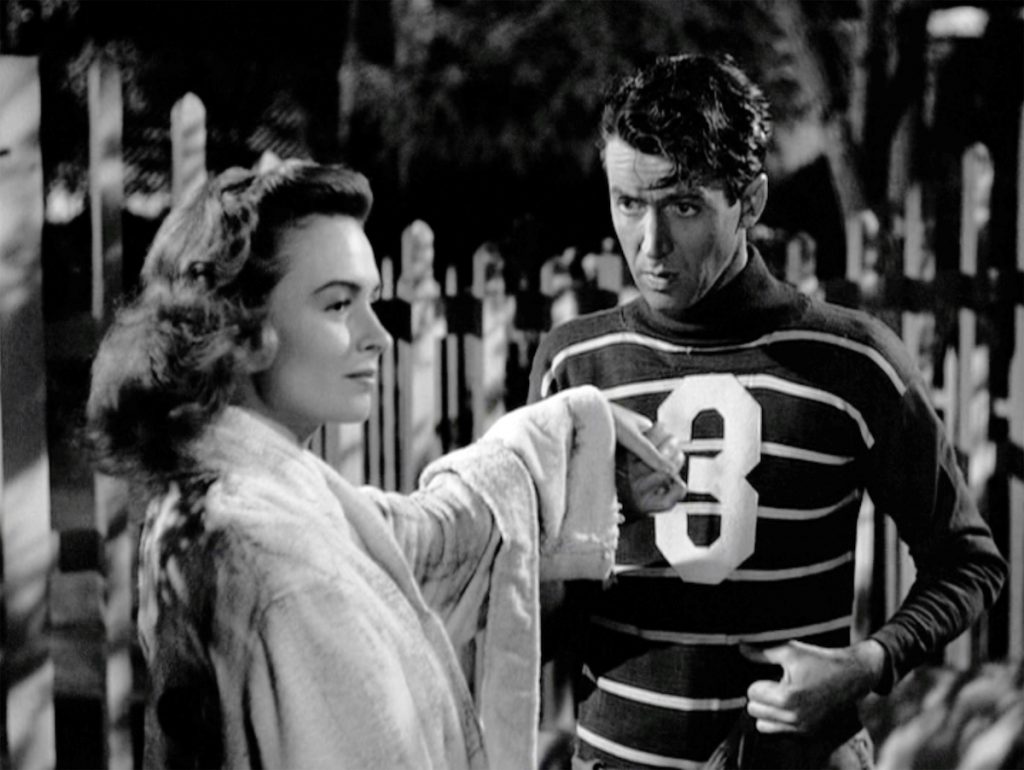Mary Bailey is the hero of It's a Wonderful Life
George is the protagonist, but Mary's the one who keeps Bedford Falls going.

(Each week, I’m publishing a new pop culture essay from a freelancer. Remember: Your subscription fee helps me pay these freelancers for their efforts! This week: Jennifer Morrison on why Mary Bailey from It's a Wonderful Life deserves more credit.)
Last December, an elderly member of my hometown church died. She coordinated church activities that needed someone in the kitchen, whether it was a soup dinner, a pancake supper, or an auction. It was her role to check that contributions had arrived, make sure the cooking materials were ready, direct the volunteers, and slice up pies and desserts. For a funeral luncheon, on a few days’ notice, she and others would make a couple plates of sandwiches, manage the potluck offerings, and clean up the kitchen afterward. (In a bitter irony, because of COVID-19, there was no funeral luncheon for her.)
Rural America depends on people like her, but they have been vanishing in droves, with far too few to replace them. They are the volunteers who know what to do. And if they don’t know what to do, they know the right people to ask to make things work. These volunteers’ roles might not get too much attention, but you’ll miss them when they’re gone.
Mary Bailey of Frank Capra’s 1946 Christmas classic It’s a Wonderful Life is a great example of that type of volunteer. Frustrated but driven George (Jimmy Stewart) is the film’s protagonist, a pillar of the fictional community of Bedford Falls, and Mary’s husband. But Mary (Donna Reed, an Iowan like me) is the heroine. Her spirit of community and personal drive play supporting roles throughout and prove key to the ending.
The influence of Mary in the movie starts right away. In the very first scene, angel Clarence Odbody takes in the life story of George Bailey, so that he might help the man, but he’s summoned only after Mary has gotten the entire town of Bedford Falls to pray for George.
George needs help because he believes his life is meaningless. He always longed to leave Bedford Falls and found himself stymied at every turn. Now, after a key bank deposit goes missing, thanks to his absent-minded uncle Billy, George faces jail time. Driven to despair, he is on the brink of ending his life when Clarence intervenes to show him how wrong he is. Clarence shows George what the world would be like without him, underlining the positive difference George has made.
(If by some chance you need a refresher of the section of the movie in which George gets to see this alternate universe, here’s a two-part video that splices a ton of parodies into a surprisingly full version.)
But even in George’s moment of despair, Mary's response to George's obvious distress over the missing money is both prayerful ("Yes, Janie, pray very hard") and practical. Mary doesn't go to the bar or yell at her kid’s teacher on the phone, two things George does. No, Mary gets to work.
Is she just another woman cleaning up a man’s mess? Far from it. She acts out of her love for George and her family. And she acts out of love for her community. The initiative is hers and hers alone.
We shouldn't be surprised by Mary’s reaction. Throughout the movie, Mary knows what she wants and goes after it. As a young adult, Mary is extremely assertive with her feelings, to the point that she practically seduces an oblivious George. Her desire to stay in Bedford Falls and put in the work to make an abandoned house a home illustrates a commitment to her hometown that George doesn’t fully grasp until the end of the film.

When the people of Bedford Falls crowd into the Baileys’ house and pour their donations into the basket, making up the crucial shortfall that will help George avoid jail time, Billy says, “Mary did it! She told some people you were in trouble and they scattered all over town collecting money. They didn't ask any questions – just said: ‘If George is in trouble – count on me.’” George didn’t entirely have faith in his fellow Bedford Falls citizens. But Mary’s faith in the people around her is steadfast and, ultimately, reciprocated.
Mary understands the value of what Robert Putnam decades later in his 2000 sociology book Bowling Alone called “social capital” — “social networks and the norms of reciprocity and trustworthiness that arise from them.” The most succinct definition of social reciprocity, Putnam admits, did not come from an academic. It is attributed to Yogi Berra: “Always go to other people’s funerals; otherwise, they won’t come to yours.”
Mary is the type of person who attends every school play, eats at every church supper, and contributes (by money, food, talent, or attendance) to every fundraiser, without a second thought. Mary has faith that if the time ever came to call on the townspeople for help, they would be there, just as she and George had been there for them. And they are.
Contrast Mary’s attitude with that of the film’s antagonist, Mr. Potter. Potter believes the “riff-raff” will run George out of town on a rail if he asks for aid. That sentiment shows Potter’s complete disconnect from the people of Bedford Falls. George’s belief his friends didn’t have the money he needed was an underestimation of both his number of friends and the power of small donations (after all, GoFundMe wouldn’t be around for more than 60 years).
Even in a world without George, Mary’s commitment to community comes through. She works at the library in Pottersville, the place that Bedford Falls would have become without George’s presence. Pottersville, with a downtown full of dive bars, dance halls and pawn shops, doesn’t seem likely to prioritize libraries or other civic institutions, but Mary is still there for the town, even if it means being a doomed “old maid” at the age of 35.
The only thing George ever wants to do in Bedford Falls is leave, to “shak[e] the dust of this crummy little town off my feet.” George was so consumed by his ambitions that all the good work he actually did got lost in his own mind. Mary, though, sees Bedford Falls as a place that offers a good life (perhaps even a wonderful one), surrounded by a network of friends who celebrate the happy moments and come together in times of trouble.
Mary has seen up close what George means to the community. Her prayer to God to “watch over him” is a prayer that George will be able to see for himself how much meaning he provides to those who surround him.
George Bailey needs Bedford Falls, and Bedford Falls needs George Bailey. Both of them need Mary Bailey just as much.
Episodes is published three times per week and edited by Emily VanDerWerff. Mondays feature her thoughts on assorted topics. Wednesdays offer pop culture thoughts from freelance writers. Fridays are TV recaps written by Emily. The Wednesday and Friday editions are only available to subscribers. Suggest topics for future installments via email or on Twitter. Read more of Emily's work at Vox.


